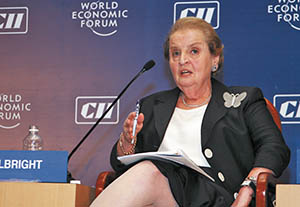
Former U.S. secretary of state Madeleine Albright is backtracking, a little, on her remark last week that “there is a special place in hell” for women who failed to endorse Hillary Clinton. Writing on the op-ed page of the New York Times, Albright did not apologize or withdraw the comment, but she did concede that it was “undiplomatic” of her to say what she said.
Indeed, friends of Israel have had bitter experiences with Albright’s “undiplomatic moments.”
During the 2014 Gaza War, Albright told CNN’s Wolf Blitzer that Israel’s anti-terrorism actions were “disproportionate” and that Israel has lost its “moral authority.”
This is the same Madeleine Albright who was asked on “60 Minutes,” on May 12, 1996, if international sanctions against Iraq were worth the cost, because “we have heard that half a million [Iraqi] children have died.” Albright replied, “We think the price is worth it.” So much for proportionality!
One of Albright’s most memorable undiplomatic moments took place on Oct. 4, 2000, when she was meeting with Palestinian leader Yasser Arafat and Israeli prime minister Ehud Barak, at the residence of the U.S. ambassador in Paris. At some point, Arafat had a temper tantrum and stormed out of the meeting. Albright went running down the hall after him, stumbling in her high heels, and shouting to the guards, “Shut the gates! Shut the gates!” in the hope of blocking Arafat’s car from leaving. (We know about this pathetic scene because a Palestinian negotiator happened to be in the hallway, speaking on the phone to a Reuters correspondent, just as the chase and shouting erupted. The Reuters reporter overheard what happened and broke the story.)
Less than 15 months later, Israel intercepted the “Karine A,” a ship carrying 50 tons of weapons that the “moderate” Arafat was trying to smuggle into Gaza. I don’t recall any op-ed in the New York Times by Albright admitting that she might have been wrong to place her faith in Arafat and to pressure Israel to make concessions to him.
American victims of Palestinian terrorism know a thing or two about Albright’s habit of “undiplomatic moments.”
When president Bill Clinton went to Israel in early 1996, he visited the grave of Nachshon Wachsman, an Israeli-American who had been kidnapped, tortured, and murdered by Palestinian terrorists. Clinton personally promised Nachshon’s parents that the U.S. would “make it a top priority” to capture the mastermind of the killing, Mohammed Deif.
Martin Indyk, who was then the U.S. ambassador to Israel, reiterated that promise in writing. In a letter to the Wachsman family on March 26, 1997, Indyk pledged that “the arrest of Muhammed Deif…remains a high priority for the U.S. government.”
Then, on Dec. 19, 1997, secretary of state Albright took part in a conference call with American Jewish leaders, which was organized by the Conference of Presidents of Major American Jewish Organizations. A leader of the National Council of Young Israel asked Albright why it was that the Clinton administration did not insist press the Palestinian Authority (PA) to hand over killers of Americans, such as Deif, who were being sheltered in PA territory. Incredibly, Albright replied that she did not know who Deif was.
It is simply inconceivable that the secretary of state did not know who Deif was. Albright was deeply involved in the Israeli-Palestinian negotiations. She had to be aware of the fact that Bill Clinton and the U.S. ambassador to Israel, with whom she worked closely, had made high-profile public statements about Deif.
Moreover, Albright had developed a close relationship with Arafat. Recall this nugget from The New Republic (April 26-May 3, 1999): “Contrast [Albright’s] truculence toward [Prime Minister Benjamin] Netanyahu with her cordiality toward Arafat. One high [Clinton] administration official, on seeing her kissing the Palestinian leader during his last visit to Washington, said, ‘Oh my God, she’s all over him.’ Albright also entertained Arafat at a dinner at her home, an almost unprecedented intimacy.”
Albright was that close to Arafat, yet she didn’t know anything about the most-wanted Palestinian fugitive in the world, who was being sheltered by Arafat? Come on.
So why was Albright “undiplomatically” denying knowledge of Deif? Because it would have meant having to answer the unanswerable question: why our State Department and the Justice Department refuse to pursue justice when the killers of Americans are Palestinians. I am tempted to say that there is “a special place in hell” for those who knowingly let murderers walk free. But that would be stooping to Madeleine Albright’s level.
By Stephen M. Flatow/JNS.org
Stephen M. Flatow, a New Jersey attorney, is the father of Alisa Flatow, who was murdered by Palestinian terrorists in 1995.










